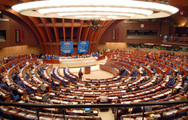小熊無尾◎還我尾巴◎
【瓦解共產極權從破除謊言開始 】共產政體有兩大支柱,一個是暴力,一個是謊言,就是槍杆子和筆杆子,謊言的作用遠比暴力要大數倍共產黨執政的血腥恐懼絕非偶然
--在歐洲委員會全體大會決議投票前的辯論發言
2006年1月25日,代表歐洲46個國家的歐洲委員會在其全體大會上以99票對42票通過了國際譴責共產獨裁政權罪性之必要性決議,引起各國高度關注。
歐洲是共產幽靈產生的地方。歐洲委員會全體大會上所通過的這個決議,開創了一個新的曆史和一個國際譴責共產獨裁政權的新起點。
在決議表決前,大會舉行了兩個多小時的激烈辯論,多國議會的代表在會上發表講話。以下是格魯吉亞共和國(Georgia) 波可裏亞(Giga Bokeria)先生的發言︰
我要感謝並強烈支持特派員所提供的決議草案。即使沒有日裏諾夫斯基先生(Mr Zhirinovsky)的支持,我也不會改變自己的決定。在日裏諾夫斯基先生之前發言的久加諾夫先生(Mr Ziuganov)是俄羅斯聯邦最大反對黨領袖。蘇俄共黨首領對譴責共產黨罪行一事未發一言,這我並不意外。蘇俄總統普汀先生近期表示蘇聯的瓦解是二十世紀的最大悲劇,此時其同僚如何能表態支持譴責共產獨裁政權呢?
共產黨的傳統在我的國家是很鮮明的,在任何由共產黨所統治的國家皆是如此。盧卡申科先生(Mr Lukashenko)也許不是個純粹的共產黨員,但他是共產政權下的產物。大家都知道現今有些國家仍然受到共產黨的統治,其人民因自身的信仰而遭受迫害或殺害。最近烏克蘭代表成員在聽見國際間正在著手準備一份1930年間群體滅絕罪行的調查報告時而哭泣。為犯罪負起道義責任是必須的。
今天我們所聽聞的部分發言讓我感到投票支持本決議案是很重要的。有部分聯合左翼黨團和社會黨的同事提出了一個罕見的論點。他們指問這份報告主張的是譴責共產主義意識型態還是那些相信共產黨的人?絕對沒有這回事,就是譴責共產獨裁政權。人們或許不想把共產主義意識型態和共產黨罪行劃上等號,特別是那些自認為是共產黨員者不願支持這份報告。我並不是指自認是共產黨員的就是罪犯或有暴力傾向,但事實是︰當共產黨在掌握統治權後,其執政結果都是以血腥和恐懼收場。這絕非偶然的。科薩契夫先生(Mr Kosachev)所舉的摩爾多瓦(Moldova)例子是無關的。摩爾多瓦的情況並非是因為共產黨獲得政權後所導致的結果,而是因為蘇聯的瓦解。隻要共產黨成為絕對多數,結局就是鎮壓。這絕非單一例子。
我反對任何標誌和觀念有關的禁令。然而我看見年輕人穿著蘇維埃標誌的衣服而感到難過,因為我的國家曾經受到這些標誌占領,直至今日仍在受難。我們必須用自己的話和意見來戰勝那些人的主張。我們的目標是排斥任何不願與共產罪行劃清界線的政治團體。我的同事說過︰在共產黨成為少數團體之前,他和共產黨員之間從沒發生過任何問題。現在就是這種情況,共產黨在歐洲已經是少數團體了。讓我們投票支持這個決議案,為維護自由而盡一切最大努力。
歐洲委員會決議:
國際譴責共產獨裁政權罪性之必要性(譯文)
作者:純子
2006年1月25日,代表歐洲46個國家(除白俄羅斯外--Belarus)的歐洲委員在全體大會上通過了“國際譴責共產獨裁罪行之必要性”的決議。由於歐洲是共產幽靈產生的地方,因此該決議對國際譴共產政權的罪行和維護世界人權具有很大的曆史意義。以下是該決議的譯文及英文原文:
二、曾在上個世紀統治中歐及東歐的前共產獨裁政權,以及在近年仍然執政的共產獨裁政權,都以大麵積的侵犯人權為特征,無一例外。在不同的文化中、國家和曆史階段,其犯下了不同的人權侵犯罪行。其中包括對個人和團體的暗殺及死刑,集中營的迫害致死,饑餓,驅逐流放,酷刑,奴役及其它多種形式的肢體恐嚇,基於道德和信仰基礎上的迫害,侵犯良心、思想、言論自由,侵犯媒體自由和一黨製。
三、這些罪行是在階級鬥爭的理論和無產階級專政的原則為由下進行的。這兩種理論成為“鏟除”那些其認為對建設新社會有害的人的依據,諸如共產獨裁政權的敵人。受難者大多是其本國的公民。尤其是受前蘇共統治的人民,其受難者的人數非常大。
四、本大會注意到,盡管共產獨裁政權犯下了很多罪行,但歐洲的一些共產黨對爭取民主做出了某些貢獻。
五、在中歐及東歐的共產獨裁政權倒台後,其罪行未被國際調查全麵追蹤。更明顯的是,這些罪行的罪魁禍首,未能向民族主義分子(納粹)所犯的可怕罪行一樣,受到國際社會的審判。
六、後果為公眾對共產獨裁政權所犯的罪行缺乏認識。共產黨仍在有些國家是合法的並很活躍,甚至有些共產黨仍然沒有與過去共產獨裁政權所犯的罪行劃清界限。
七、本大會確信,對這些曆史的關注是防止將來同樣罪行發生的前提條件之一。更主要的是,確定道德和譴責這些罪行將會對教育後代起重要作用。國際社會對過去曆史所持的立場,可以成為未來行動的參考。
八、本大會尤其相信,那些受難於共產獨裁政權罪行的幸存者及其家人應該得到人們對的同情、理解和對其所受苦難的承認。
九、世界上還有共產獨裁政權的存在並仍然在繼續犯罪。對國家利益的認識不應阻止他國對現存共產獨裁政權的充分批評。本大會強烈譴責所有那些侵犯人權的罪行。
十、目前,在本委員會會員國內所進行的辯論和譴責不足以使國際社會對共產獨裁政府所犯的罪行采取明確立場。不推遲的這樣做是本會的道德義務。
十一、歐洲委員會是在國際上進行這種辯論的適合之地。所有歐洲前共產國家,除白俄羅斯(Belarus)外,如今已是本會的會員國並以捍衛人權和依法治國為其基本價值。
十二、因此,本大會強烈譴責共產獨裁政權大麵積的侵犯人權的罪行,並對那些受難者表示同情、理解和其所受之苦難的承認。
十三、本大會呼籲會員國內現存的和過去的共產黨,假如還沒有做的話,重新評估共產主義的曆史和本國過去的曆史,明確的與共產獨裁政權所犯的罪行劃清界限,並對其罪行進行嚴肅的譴責。
十四、本大會相信,國際社會明確的立場將為未來的和平共處鋪平道路。希望其將會激勵世界範圍內的曆史學家,繼續從事對過去所發生事件的確定和客觀查證的研究。
英文原文:
http://assembly.coe.int/Mainf.asp?link=/Documents/AdoptedText/ta06/Eres1481.htm
Need for international condemnation of crimes of totalitarian communist regimes
Resolution 1481 (2006)
1. The Parliamentary Assembly refers to its Resolution 1096 (1996) on measures to dismantle the heritage of the former communist totalitarian systems.
2. The totalitarian communist regimes which ruled in Central and Eastern Europe in the last century, and which are still in power in several countries in the world, have been, without exception, characterised by massive violations of human rights. The violations have differed depending on the culture, country and the historical period and have included individual and collective assassinations and executions, death in concentration camps, starvation, deportations, torture, slave labour and other forms of mass physical terror, persecution on ethnic or religious base, violation of freedom of conscience, thought and expression, of freedom of press, and also lack of political pluralism.
3. The crimes were justified in the name of the class struggle theory and the principle of dictatorship of the proletariat. The interpretation of both principles legitimised the “elimination” of people who were considered harmful to the construction of a new society and, as such, enemies of the totalitarian communist regimes. A vast number of victims in every country concerned were its own nationals. It was the case particularly of peoples of the former USSR who by far outnumbered other peoples in terms of the number of victims.
4. The Assembly recognises that, in spite of the crimes of totalitarian communist regimes, some European communist parties have made contributions to achieving democracy.
5. The fall of totalitarian communist regimes in Central and Eastern Europe has not been followed in all cases by an international investigation of the crimes committed by them. Moreover, the authors of these crimes have not been brought to trial by the international community, as was the case with the horrible crimes committed by National Socialism (nazism).
6. Consequently, public awareness of crimes committed by totalitarian communist regimes is very poor. Communist parties are legal and active in some countries, even if in some cases they have not distanced themselves from the crimes committed by totalitarian communist regimes in the past.
7. The Assembly is convinced that the awareness of history is one of the preconditions for avoiding similar crimes in the future. Furthermore, moral assessment and condemnation of crimes committed play an important role in the education of young generations. The clear position of the international community on the past may be a reference for their future actions.
8. Moreover, the Assembly believes that those victims of crimes committed by totalitarian communist regimes who are still alive or their families, deserve sympathy, understanding and recognition for their sufferings.
9. Totalitarian communist regimes are still active in some countries of the world and crimes continue to be committed. National interest perceptions should not prevent countries from adequate criticism of present totalitarian communist regimes. The Assembly strongly condemns all those violations of human rights.
10. The debates and condemnations which have taken place so far at national level in some Council of Europe member states cannot give dispensation to the international community from taking a clear position on the crimes committed by the totalitarian communist regimes. It has a moral obligation to do so without any further delay.
11. The Council of Europe is well placed for such a debate at international level. All former European communist countries, with the exception of Belarus, are now its members and the protection of human rights and the rule of law are basic values for which it stands.
12. Therefore, the Parliamentary Assembly strongly condemns the massive human rights violations committed by the totalitarian communist regimes and expresses sympathy, understanding and recognition to the victims of these crimes.
13. Furthermore, it calls on all communist or post-communist parties in its member states which have not so far done so to reassess the history of communism and their own past, clearly distance themselves from the crimes committed by totalitarian communist regimes and condemn them without any ambiguity.
14. The Assembly believes that this clear position of the international community will pave the way to further reconciliation. Furthermore, it will hopefully encourage historians throughout the world to continue their research aimed at the determination and objective verification of what took place.







